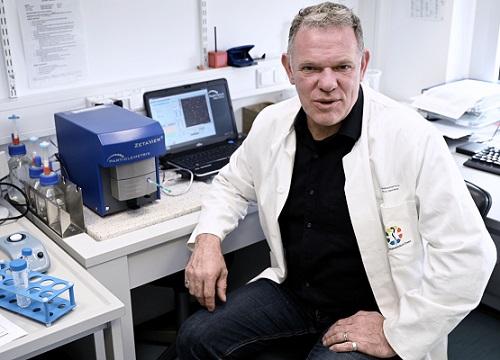Mursla, a liquid biopsy company, is pleased to announce the appointment of Professor Bernd Giebel, Dr Daniel Delubac and Professor Emmanuel Rautou to its Advisory Board.
Professor Bernd Giebel (PhD) (pictured) is Professor at the University Duisburg-Essen. Highly experienced in the phenotypic characterisation of rare cells, (hematopoietic stem and progenitor cells), Bernd introduced Nanoparticle Tracking Analysis (NTA) to the scientific community as a quantification and size-measuring method for extracellular vesicles (EV) / exosomes in 2011. In the same year he was also involved in the world’s first human stem-cell derived EV administration. In addition, his group also established imaging flow cytometry (IFCM) for single EV characterisation, in complex samples. To date, Bernd has over 100 publications, the majority focused on EVs/exosomes. Bernd is an active member of the International Society of Extracellular Vesicles (ISEV), having coordinated several ISEV’s positioning papers on the therapeutic application of EVs/exosomes. He is the co-chair of the exosome-committee of the International Society of Cell and Gene Therapy (ISCT) and the president of the German Society of Extracellular Vesicles (GSEV), which he founded together with other German EV experts in 2017. In 2021, Bernd founded Exosla, an exosome therapeutics company. He used to sit on the scientific advisory board of EVOX Therapeutics.
Professor Giebel commented: “Mursla’s novel, very sensitive platform addresses key challenges in the exosome field. It allows purification of specific exosome sub-populations and their subsequent comprehensive characterisation. The integrated deep discovery and high sensitivity platform allows exosome characterisation at the highest level and will facilitate the translation of exosomes into the clinical setting.”
Dr Daniel Delubac (PhD) is COO at Xilis. A seasoned leader, manager and engineer specialised in biotechnology with experience spanning clinical diagnostics research, product development and lab operations, as well as synthetic biology, Daniel has significant experience working with liquid biopsy companies. Having started his career at Counsyl, where he built the first fully automated, blood-to-data, robotic system for clinical-grade Next Generation Sequencing, he then joined liquid biopsy company Guardant Health, where he supervised both process engineering at the company level and automation for sample processing. Subsequently, at Freenome, another liquid biopsy biotech, he led execution on wet lab R&D, process engineering, automation, laboratory operations and supply chain, building next generation products for the unbiased discovery of cancer biomarkers using robotics and AI.
Dr Delubac added: “The liquid biopsy space has made tremendous progress over the last few years thanks to the advancement of circulating free DNA assays. Mursla’s exosome approach offers an innovative and fresh take on finding and identifying alternative, yet extremely valuable, multi-omics tumor information in the bloodstream.”
Professor Pierre-Emmanuel Rautou (MD, PhD) is a clinical specialist in Hepatology with a PhD in vascular biology. He also has a particular interest in exosomes and having undertaken research in this area has published a number of original and review papers on the subject. Currently Professor of Hepatology at the University of Paris and Hôpital Beaujon, Clichy, France (since 2016) and head of the splanchnic hemodynamic laboratory at Beaujon Hospital, Clichy, France (since 2012), Pierre-Emmanuel is also leading an Inserm team dedicated to the study of the role of vessels in liver diseases, at the Paris Research Center for Inflammation. His research is focused on the role of vessels in liver diseases. Specifically, he is interested in primary vascular liver diseases (Budd-Chiari syndrome, portal vein thrombosis and intrahepatic non cirrhotic portal hypertension), as well as in vascular involvement in common liver diseases development and complications.
Prof Rautou stated: “Mursla’s blood test could facilitate earlier diagnosis of diseases such as hepatocellular carcinoma (HCC) - a major global health problem with an 87% mortality rate after five years. Current diagnostics, like ultrasound, are not accurate enough. There are around eight million patients at risk of HCC across the US and Europe for whom earlier diagnosis could significantly increase their chance of a cure. Mursla’s approach, focused on liver-derived exosome sub-populations as a starting point, is very interesting – especially given the ability to identify new markers that were hardly visible before, whilst having an assay that can be built using a similar workflow.”
Pierre Arsène, Founder and CEO, Mursla commented of the appointments: “Professors Giebel, Rautou and Dr Delubac are significant opinion leaders in their fields; we feel privileged to have them on board and look forward to benefitting from their expertise and experience. Ultimately, I hope that their input will bring us one step closer to our objective of getting Mursla’s novel exosome-based lab test into the clinic.”
